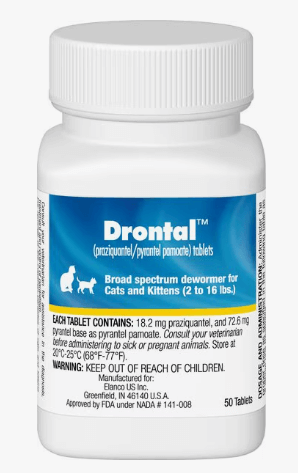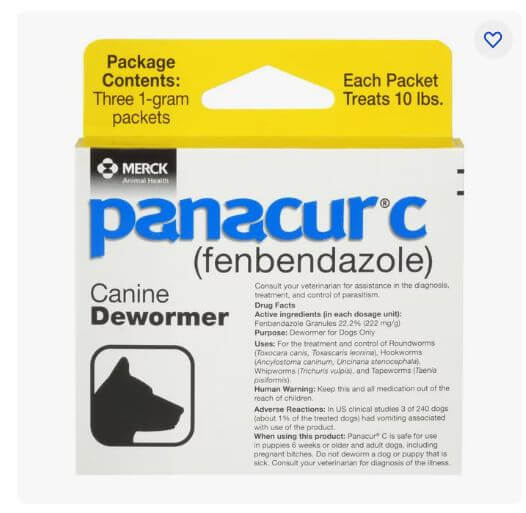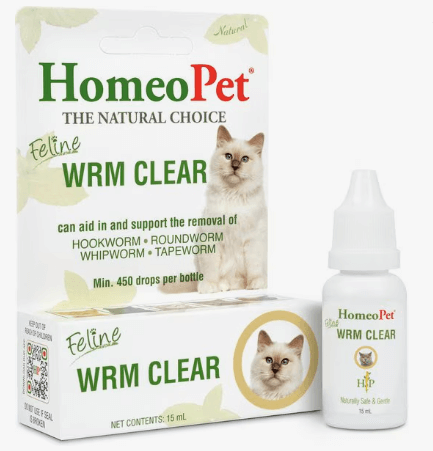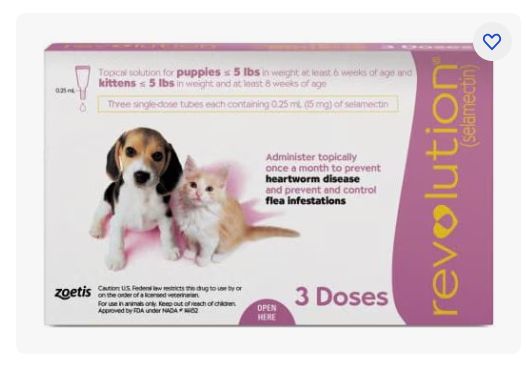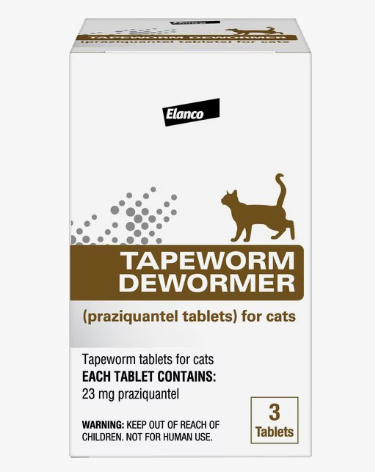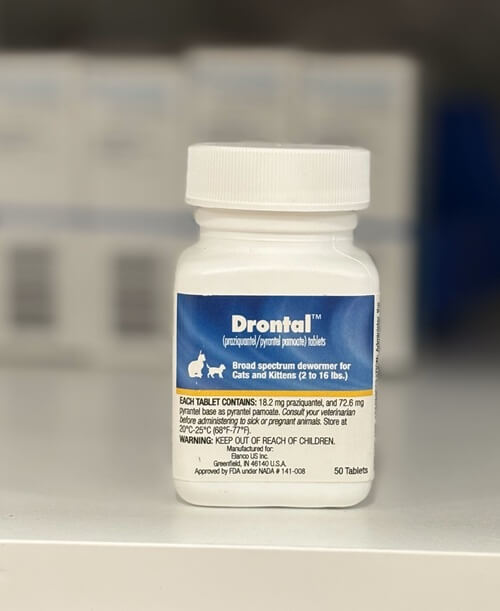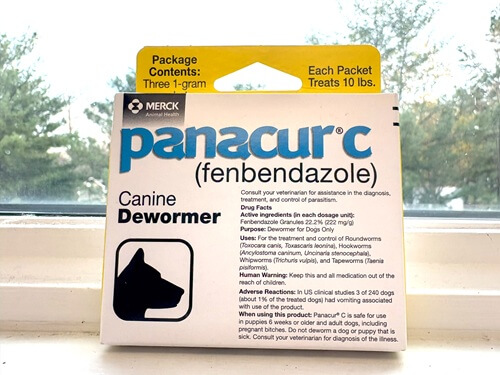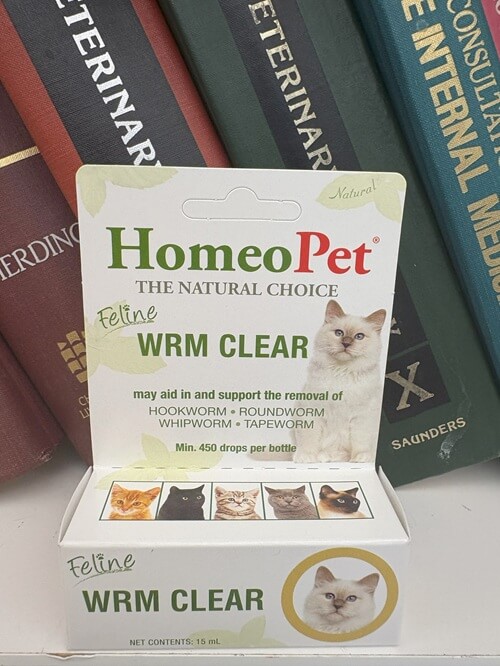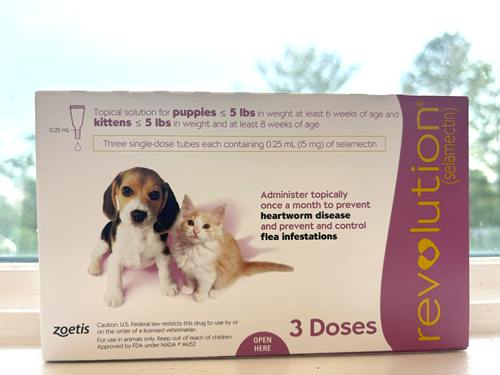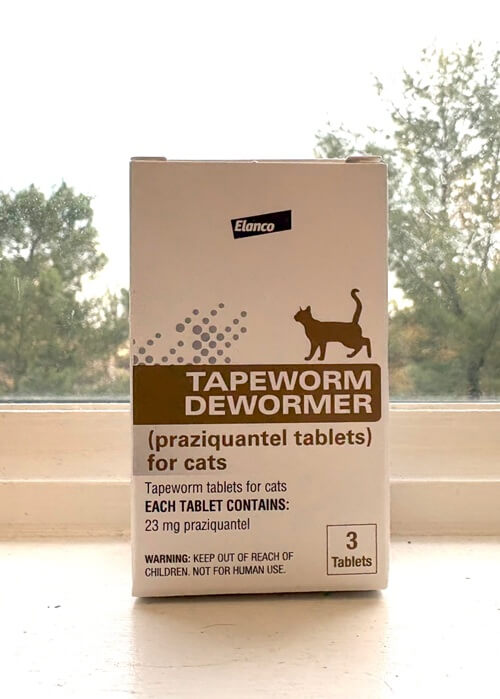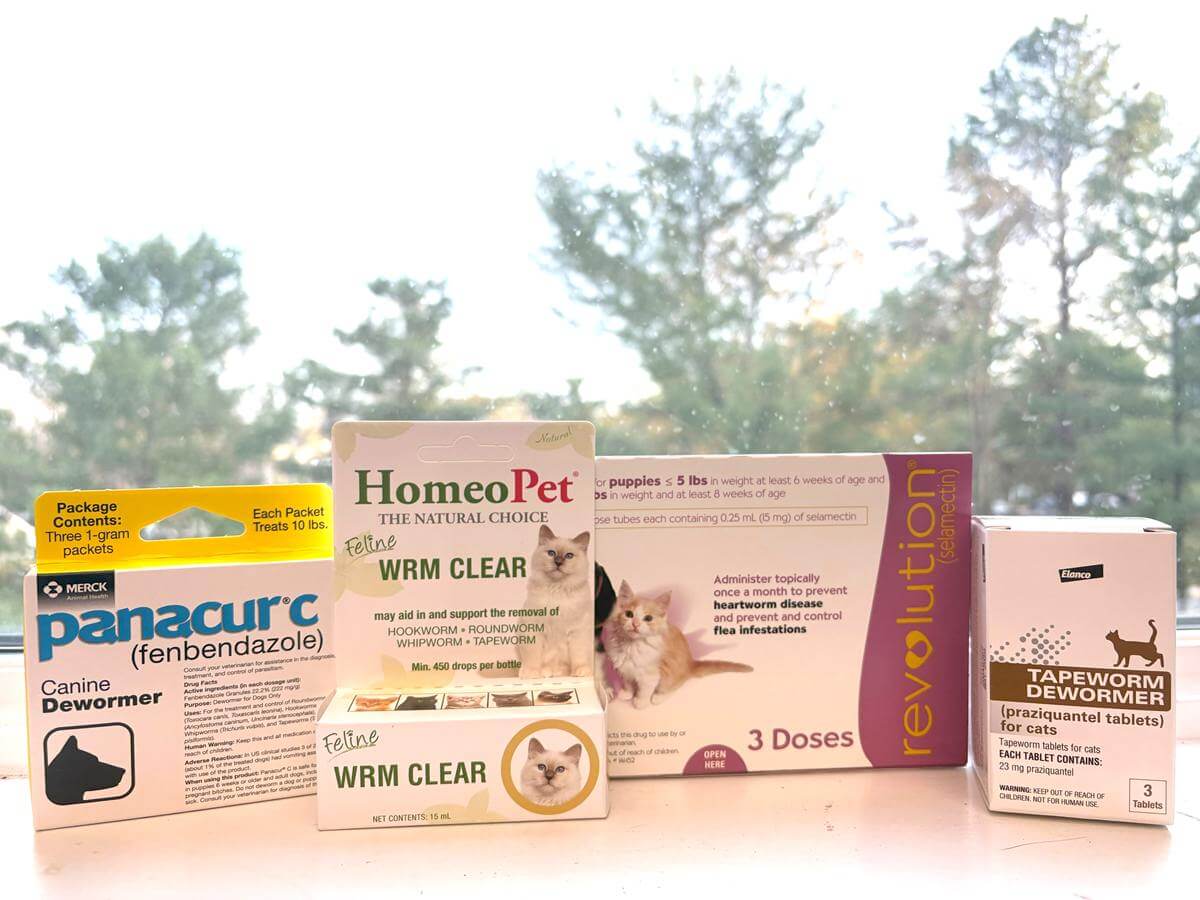
Chris Vanderhoof / Cats.com
Whether your cat has tapeworms, roundworms, hookworms, or something else, the best cat dewormer targets your cat’s infection and eradicates it. To do that, it is important to confirm your cat has intestinal parasites and what kind. Some cats may even have more than one! When targeting the right parasites, great dewormers are safe, affordable, and effective.
Because it’s an affordable broad-spectrum dewormer that kills three of the most common intestinal worms, we recommend Drontal Tablets for Cats & Kittens as the best on the market.
At a Glance: Top 5 Best Cat Dewormers To Buy




Want a quick look at the products reviewed in this article? In the comparison table below, we’ve highlighted some of the most important features of each product. You’ll find more detailed information about each product later in the article.

Drontal Tablets for Cats & Kittens
- Safe and reliable - side effects are minimal and rare
- Easy to dose
- Used by veterinarians

Panacur C Dewormer (Fenbendazole)
- Effective against hookworms, roundworms, whipworms, and Giardia
- Safe for adult cats and kittens
- Very inexpensive

HomeoPet Feline WRM Clear Cat Supplement
- Claims to be effective against hookworms, roundworms, tapeworms, and whipworms
- Homeopathic formula free from chemical ingredients
- Non-sedating formula, easy to administer in food or by mouth

Revolution Topical Solution for Cats
- Kills roundworms and hookworms
- Excellent reputation for effectiveness and safety
- Ideal for cats who don’t like oral medications

Elanco Dewormer for Tapeworms for Cats
- Safe for cats and kittens 6 weeks and older
- Safe to take with food
- Effective against tapeworms
Before we review Drontal and the rest of our top 5 recommendations, let’s talk about how dewormers work and the art of choosing a good one.
Top Picks Explained
Does Your Cat Need a Dewormer?
According to the Cornell College of Veterinary Medicine, intestinal parasites affect as many as 45% of cats. All cats are prone to parasite infections but cats that spend a lot of time outdoors have a higher risk for infection than indoor cats.
Intestinal parasites rarely cause life-threatening issues in adult cats, but kittens and cats with heavy parasite burdens can suffer from severe effects as the parasites cause bleeding, injure the intestines, and steal needed nutrients.
A heavy worm infestation may cause the following symptoms:
- Vomiting
- Constipation
- Dry, dull coat
- Pale gums
- Coughing
- Bloated belly
- Dark, tarry stools
- Weight loss
- Diarrhea
- Biting/licking the anus
Many of these symptoms are related to malnutrition that can develop if an intestinal parasite infection goes untreated for a long time.
Though most intestinal parasite infections are not life-threatening, they can be quite dangerous for kittens if they develop anemia from blood loss and dehydration from fluid loss if diarrhea is present. Intestinal blockages caused by too many tapeworms can also be deadly.
How to Identify Intestinal Parasites in Cats?
There are only very few cases where you’ll be able to tell for certain if your cat has intestinal parasites and what type(s) they’re having trouble with.
Tapeworms are the most common worm that cat parents will actually see. While roundworms may be seen, this is not common. You may see them only after treatment with a dewormer and even then, only with heavier infections.
All other intestinal parasites are not visible to the naked eye and may even be hard to see under a microscope, they are so small.
If you think your cat is affected by intestinal parasites, it is extremely important to confirm this and identify what parasites are present. That allows your vet to select the right medication, your cat’s treatment will be as short as possible, and most importantly, they’ll be parasite free!
Digestive upset signs like diarrhea and blood in the stool that are caused by intestinal parasites may also be caused by lots of non-parasitic causes. Poor nutrition, diet changes, other types of viral or bacterial infections, and even stress may cause similar signs. That’s why confirming parasite presence is so important, so that the right treatment can be chosen.
A fecal sample is used to identify the presence of intestinal parasites. The ability of veterinarians to diagnose intestinal worms and other parasites has increased significantly in just the last 5-10 years.
Older methods of testing for parasites using in-house “fecal float” tests stand a good chance of missing some parasites. Intestinal worms are not the only kind of parasite. Protozoal parasites like Giardia, Coccidia, and Tritrichomonas are just as important causes of disease and in some cases are more common than actual worms.
Fecal float tests in a veterinary clinic have a much lower chance of detecting these parasites because they are very hard to see, even with a microscope and may require certain types of preparation to be seen in a sample.
Sending a fecal sample out to a laboratory has a higher chance of detection and is more reliable. However, relying on fecal egg counts viewed through a microscope alone may still miss parasites, even at a lab. Parasites have shedding cycles, meaning they may not always be making eggs to be detected in the stool.
This is why fecal PCR tests are now becoming more common. PCR detects the presence of something through DNA detection. PCRs are very sensitive, allowing detection of a fecal parasite even if the eggs are not being actively shed in the stool.
Fecal PCR allows for dthe etection of true intestinal worms, intestinal protozoal parasites like Giardia, and even other causes of diarrhea like viruses and bacterial toxins.
Types of Common Intestinal Worms in Cats
Here are the most common types of worms found in cats, as well as protozoal parasites that can cause similar signs of illness.
Tapeworms
These flat, long worms are named for their resemblance to a strip of tape. Tapeworms are segmented and may appear as wiggling grains of rice in your cat’s coat.
The most common type of tapeworm seen in cats, Dipylidium caninum, is transmitted through eating an infected flea. Many cats with active flea infestations or recovering from one may develop a tapeworm infection from ingesting the itchy fleas when grooming themselves. Cats who eat wild prey are also at a high risk for acquiring other types of tapeworms.
Tapeworms are the most common type of intestinal worm that cat parents will be able to detect visually on their cat at home.
Hookworms
These are tiny worms that hook onto your cat’s intestinal walls and feed off of the blood supply. Because blood loss can cause anemia, hookworms are a particularly menacing parasite for kittens and cats with a weakened immune system.
Cats can become infected when they eat a hookworm host, nurse from a queen affected by hookworms, or when the worms burrow through their skin.
Roundworms
Roundworms are passed through the feces of an infected animal and can survive in their host for years. Your cat can get them in a number of ways – by eating an infected animal, eating roundworm eggs or larvae, or (particularly in the case of kittens) through their mother’s milk.
Because kittens can be infected long after the mother’s roundworm infection cleared up, it’s safe to assume all kittens have roundworms.
Roundworms may cause diarrhea and poor weight gain in kittens. Kittens with heavy burdens may also have vomiting. A slight pot-bellied appearance in kittens is common when roundworms are present.
Potting soil can also pose a risk, especially to indoor cats. Up to 15% of potting soils may contain intestinal parasite eggs, especially roundworms.
Whipworms
Whipworms get their name from the whip-like motion of their tails when viewed under a microscope. Whipworm eggs are especially hardy and can be very difficult to get rid of from the environment.
Fortunately, whipworms don’t occur as often in cats but in those affected, they can have persistent watery diarrhea.
The most common treatment used for whipworms is fenbendazole.
Ringworm
Though the name may suggest otherwise, ringworm is not actually a worm infection – it is a fungal infection.
Common signs include circular patches of hair loss, scaling or crusty skin, changes in hair or skin color, inflammation, excessive grooming or scratching, and dandruff. The best way to treat ringworm is with an antifungal medication, not a dewormer.
Heartworms
Heartworms are true worms, but do not affect the digestive tract. Resembling roundworms in appearance, these worms are transmitted through infected mosquitoes into the bloodstream. Over a few months, the microscopic worm larvae make their way to the heart, where they grow into adults and live.
Mosquitoes affect cats more often than most think. While covered with fur, mosquitoes will bite cats on their head, nose, and ears where fur is thinner. While outdoor cats are at the highest risk, up to 25% of heartworm positive cats are considered indoor only.
Some products that treat intestinal parasites, like Revolution for cats, will also prevent heartworms.
Common Types of Intestinal Protozoal Parasites in Cats
All protozoal parasites are microscopic and even then can be small and hard to see. As fecal testing for pets has improved, protozoal parasites are being seen as a more common cause of intestinal illness than previously thought. Although they are not true worms, the medications used to treat them are still often called “dewormers” because of their similar purpose.
Giardia
Giardia cysts can live for many months in the environment, making it very easy for pets to pick up. Cats may acquire Giardia either through grooming the cysts off of themselves or a companion or through contaminated food and water sources.
Some cats may carry Giardia without showing symptoms, making them an unknown source of infection for other cats. Kittens are most commonly affected. Adult cats affected by a heavy burden may also develop signs of illness as well as older cats with compromised immune systems.
Giardia commonly causes intermittent soft stool progressing to persistent watery diarrhea, sometimes with blood. The degree of severity can correlate with how heavy the Giardia infection is.
A primary treatment for Giardia is fenbendazole, a broad spectrum dewormer also used for roundworms, hookworms, and whipworms.
Coccidia (Cytoisospora/Isospora)
Coccidia is most commonly found in kittens. It is common to find coccidia in any situation where there is a large volume of cats. This can include colonies, shelters, and breeding catteries.
Coccidia will commonly cause watery diarrhea, sometimes with mucus. Heavier infections may also cause blood in the stool and vomiting.
Unlike Giardia, coccidia doesn’t respond to fenbendazole. Albon (sulfadimethoxine) is a common treatment, though is off-label in cats. Ponazuril (Marquis), which is approved for use in horses for protozoal illness, may sometimes be used off-label, especially by shelters or rescues.
Tritrichomonas
Tritrichomonas foetus is a protozoal parasite more commonly seen in pure-bred kittens less than 12 months of age.
Blood and mucus can be seen in the stool. Any pure-bred cat with chronically persistent or off/on blood in the stool should be screened for T. foetus.
Treating T. foetus is not always straightforward. Some cats may not require treatment with the parasite’s effect lessening as a kitten gets older. But others may require treatment with a medication called ronidazole.
Cryptosporidium
As fecal PCR testing has become more commonplace, the presence of Cryptosporidium is being more recognized as a common finding in cats (and dogs). Similar to some cases of Giardia, cats may be carriers of Cryptosporidium without showing much in the way of illness. Cryptosporidium infections may also resolve on their own.
The most serious Cryptosporidium infections occur in cats with compromised immune systems or those badly affected by other intestinal parasites. In these cases, Cryptosporidium may cause watery diarrhea.
There are few medications effective against Cryptosporidium. Often the focus is to resolve other intestinal parasites or illnesses so a cat can clear the infection on their own. In some cases, tylosin or azithromycin may be tried, but are not always successful.
Types of Dewormers for Cats and the Parasites They Treat
Dewormers are available both over-the-counter and by prescription, and may be oral or topical.
Oral deworming medications come in tablets, liquids, and pastes so you can easily administer the medication in the manner most comfortable for your cat. Topical medications are typically applied at the base of the head, much like topical flea medications.
The most important thing you must do when shopping for dewormers is make sure the product you choose is made to kill the type of worms your cat has.
Praziquantel – For Tapeworms
This drug paralyzes the tapeworms by making their cells unable to hold onto calcium. This allows the worms to be killed by the body’s natural defenses and digested.
Once the worms are dead, they will eventually disintegrate and be passed in your cat’s feces, but they are often broken down so well that they can’t be seen. Praziquantel seldom causes side effects, but some cats experience excessive salivation, vomiting, or diarrhea after using it.
Pyrantel Pamoate – For Roundworms and Hookworms
This medication paralyzes worms. Since roundworms and hookworms grip onto the intestinal wall to survive, this paralysis is a death sentence. They fall off of your cat’s intestinal wall and pass out through the digestive tract in stool. Pyrantel pamoate is safe for cats and seldom causes side effects. Some cats experience vomiting, but this reaction is rare.
Piperazine – For Roundworms
Like pyrantel pamoate, piperazine does paralyze roundworms. But unlike pyrantel, it isn’t effective against hookworms. It’s important to ensure your cat receives the correct dose of this medication.
Too small a dose won’t be effective but overdose can cause nausea, vomiting, loss of balance, and muscle tremors.
Fenbendazole – For roundworms, hookworms, whipworms, Giardia
Fenbendazole is the most broad-spectrum dewormer available with the ability to treat four of the most common parasites in cats. However, it does not treat tapeworms and also does not carry a label for use in cats. Veterinarians do prescribe it off-label very often. The powder packets (Panacur or Safe-guard) may be prescribed for adult cats while the liquid Panacur (labeled for use in livestock and horses) is frequently used to treat smaller cats and kittens.
Sulfadimethoxine – For Coccidia (Cystoisospora/isospora)
Sulfadimethoxine, commonly referred to by its easier-to-say brand name Albon, is classified as an antimicrobial and is FDA approved for use in cats. It is very effective against coccidia species of parasites. The tablet sizes are often too big for cats. The yellow liquid suspension is prescribed most often.
Selamectin – For roundworms, hookworms, (and heartworms)
Selamectin is the active ingredient in Revolution. It is one of the few topical products that can treat internal parasites. It also treats fleas. Its tick coverage is narrow but the combination product also containing sarolaner (Revolution Plus) is very effective for ticks.
Eprinomectin
Eprinomectin is worth mentioning because it is one of three active ingredients in NexGard COMBO, which may be the most comprehensive parasite prevention medication available for cats. Eprinomectin is similar to selamectin targeting roundworms, hookworms, heartworms, and fleas. It is also combined with praziquantel, targeting tapeworms. The third ingredient esofoxalaner rounds out tick coverage.
What About So-Called Natural Dewormers?
Any over-the-counter or prescription medication comes with a risk of side effects, so you may be wondering about natural dewormers.
While there are several natural or herbal remedies out there, none are as reliable as traditional medications, but they may be worth investigating.
Diatomaceous Earth
This fine natural powder is a safe organic insecticide, often used in gardens to kill ants and other pests. It’s also useful for killing fleas in the environment. Its effectiveness as an insecticide has caused some to recommend it for treating internal parasite infestations.
If diatomaceous earth worked as well inside your cat as it does to kill insects externally, we’d have a fantastic natural dewormer on our hands. Unfortunately, there’s no indication that diatomaceous earth is an effective dewormer. The few studies on the effects of DE on internal parasites have failed to demonstrate any consistent deworming effect.
You don’t even need to read a study to understand the problem with diatomaceous earth for internal parasites. Diatomaceous earth works like tiny shards of glass to physically damage an insect’s protective outer shell, allowing moisture loss. In the moist environment of your cat’s GI tract, diatomaceous earth simply can’t do its job.
Herbal Blends
Some natural dewormers combine herbs and other ingredients purported to create an intestinal environment unfriendly to parasites. These dewormers often include ingredients like wormwood, black walnut, and cloves.
A study on the deworming effects of natural remedies, including pumpkin seeds, garlic, ginger, and papaya seeds on small ruminants, concluded that:
“The most promising natural/plant dewormer appears to be pumpkin seeds, especially when administered as a drench. Even though significant reductions were not observed, numerically the pumpkin seed groups had the lowest fecal egg counts and required fewer dewormings in most cases.”
Cucurbitacin is a terpenoid compound naturally found in pumpkin seeds and can cause reproductive changes in certain parasites. Though this study found some minimal effects in goats, the safety and efficacy of the use of pumpkin seeds for treating intestinal parasites in cats has not been established.
Top 5 Best Dewormers for Cats Reviewed
Keep reading to learn more about Bayer Drontal Broad Spectrum Dewormer and four more of the best dewormers for cats money can buy.
The Right Dewormer Could Save Your Cat’s Life
If the parasites stick around for long enough, an intestinal infestation can lead to anemia and malnutrition. Particularly among small, weak kittens, it might even end in death.
Furthermore, worms don’t just affect cats and dogs. Some parasites that affect cats are zoonotic, meaning they may cause disease in humans Examples can include roundworms (which can cause larval migrans in people), hookworms (which can cause cutaneous migrans in people), and tapeworms (which can only be transmitted through ingestion of an infected flea just like your cat but pets are the most common source of infection of Dipylidium caninum for people.
Most dewormers are free of serious side effects, relatively easy to administer, and effective against parasites. But you have to choose one that’s right for your cat’s situation.
Looking for the best cat dewormer without a vet prescription is not an easy task. Whether you use a broad-spectrum dewormer or get a vet’s approval for a worm-specific medication, it’s vital that you choose a dewormer that’s intended for the type of worms you’re dealing with. If you choose a deworming product that’s made to kill roundworms, it won’t do much for your cat’s tapeworm infestation.
For all the reasons above, it’s crucial to identify and treat a worm infestation as soon as possible.
The best way to do this is to submit a fecal sample to your veterinarian’s office. You can often do this without a separate appointment. But if your cat is showing signs of illness, getting a full exam too is a good idea, to see if something other than intestinal parasites may be a cause.
In some cases, intestinal parasites may cause more severe illness and hoping only a dewormer will cure it is not a good expectation. Very lethargic, dehydrated, and inappetent cats often require additional supportive treatments to heal properly and quickly.
Stool samples submitted for fecal PCR testing are the most sensitive and likely to detect intestinal parasites affecting your cat.
By choosing the appropriate dewormer and following the label instructions, you can safely eradicate your cat’s infestation and bring him back to health.
Best Cat Dewormers Comparison Chart
| Product Name | Format | Active Ingredient | Parasites Targeted |
| Drontal Broad-Spectrum Dewormer | Tablet | Praziquantel, Pyrantel Pamoate | Tapeworms, Roundworms, Hookworms |
| Panacur C Dewormer (Fenbendazole) | Powder, liquid | Fenbendazole |
Roundworms, Hookworms, Whipworms, Giardia
|
| HomeoPet Feline WRM Clear Cat Supplement | Liquid | Arsenicum Album, Chenopodium Anthelminticum, Cucurbito Pepo, Filix Mas, Kamala, Natrum Phosphoricum |
Tapeworms, Roundworms, Hookworms, Whipworms
|
| Revolution Topical Solution for Cats | Topical | Selamectin |
Fleas, Heartworm, Hookworms, Roundworms, Ear Mites
|
| Elanco Dewormer for Tapeworms for Cats | Tablet | Praziquantel | Tapeworms |
